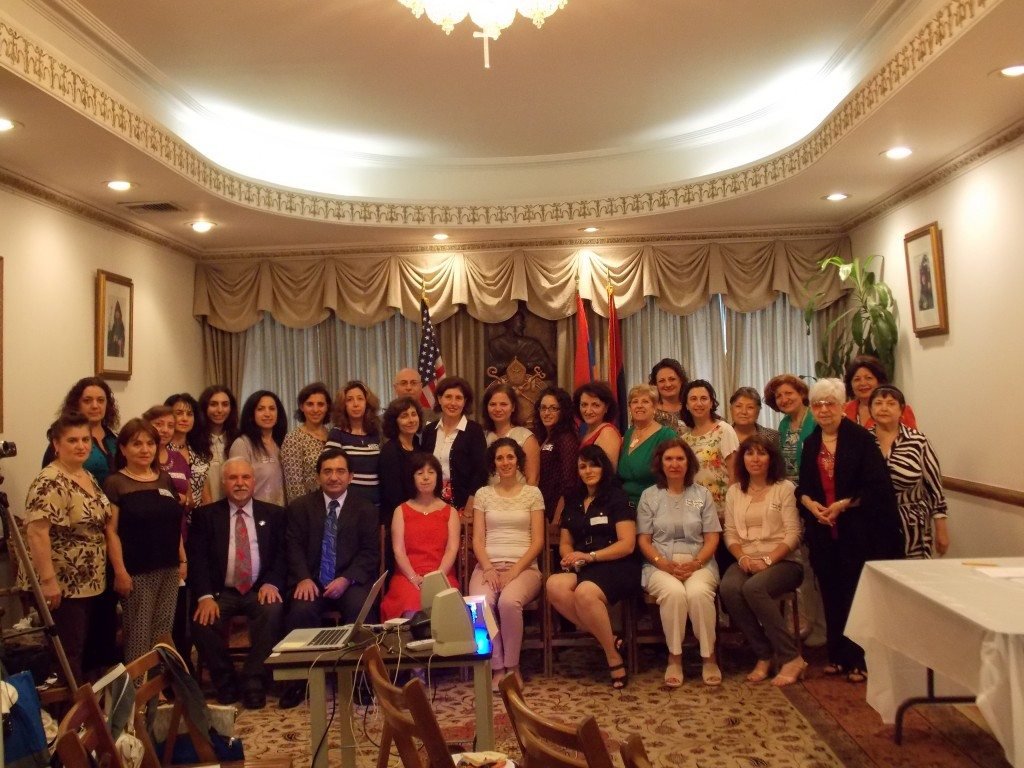Twenty-three teachers from 8 Armenian Saturday schools from New York, New Jersey, Philadelphia, Boston, and Chicago came together on Sat., Aug. 23 for a one-day seminar organized by the Armenian National Education Committee (ANEC) at the Prelacy headquarters in Manhattan. The program, introduced by ANEC Executive Director Dr. Vartan Matiossian, was well received by the audience.

Rev. Mesrob Lakissian, pastor of St. Illuminator’s Cathedral in Manhattan and a member of ANEC, greeted the audience on behalf of His Eminence Archbishop Oshagan Choloyan, Prelate. Der Mesrob acknowledged the participation of teachers from St. Illuminator’s Armenian Saturday School (New York), Nareg Saturday School (New Jersey), Haigazian School (Philadelphia), St. Stephen’s Armenian Saturday School (Boston), and Taniel Varoujan Armenian Saturday School (Chicago), all under ANEC jurisdiction, as well as from St. Vartan Saturday School, Armenian School of Brooklyn (New York), and St. Leon’s Armenian School (New Jersey), which are under the jurisdiction of the Diocese. Also attending the seminar was Gilda Buchakjian, the coordinator of Armenian studies at the Eastern Diocese.
The lecturer in the morning was Sossi Essajanian, a teaching assistant at the United Nations International School and a member of ANEC, who spoke on best practices of early childhood teaching and their application to Armenian schools. Essajanian introduced the various theories on child development and focused on literacy development, the main concern of our schools. Afterwards, she introduced various helpful ideas about reading development, where fluency is crucial, she noted. The rest of the presentation was devoted to discussing practical ideas and suggestions for teaching listening and speaking, classroom layout, scheduled planning, and learning Armenian as a second language. These ideas were adapted to the needs and the limitations of Armenian one-day schools. Essajanian spoke in English, complemented with a PowerPoint presentation in Armenian, which is available on the ANEC section of the Armenian Prelacy website at www.armenianprelacy.org.
After the lunch break, Anahid Garmiryan gave a thought-provoking presentation titled, “To Be or Not to Be a Teacher: The Challenges of Bilingualism.” Garmiryan was the long-time principal of the Hovnanian School in New Jersey, and was recently designated as the senior program officer for Western Armenian language support at the Calouste Gulbenkian Foundation in Lisbon, Portugal. Garmiryan began by challenging the traditional idea of the teacher as someone who knows everything or knows something better, and maintained that teachers are actually learners, whose mission is not to teach to their students, but to have them acquire knowledge—in our case, the knowledge of the Armenian language. To be a “no teacher,” she said, is to put oneself in the situation of a language learner and turn language learning into a healthy experience. Teaching Armenian as a second language implies knowing what to do in order to provide the learner with all the means necessary for language acquisition. Textbooks help to put knowledge in order, but we are confronted with the challenge of learners who may see things differently when it comes to the process of acquisition. A teacher’s task is to create the appropriate conditions to make the language audible and turn it into a means of communication. This entails motivation to learn the language, demand to do so, and the generation of interest on the part of the student.
Garmiryan was particularly adamant about the need to understand that language learning is a process of participation where no one has the monopoly on language, and that teachers should work under the premise that everyone can learn. An appropriate environment should be assured for creative means to acquiring language, such as language games, theater, and painting, instead of focusing on the preparation of a “hantes,” she said.
The final item of the agenda was a discussion about successful and unsuccessful experiences, coordinated by ANEC member Dr. Asbed Vassilian, where each school made short presentations that led to an interesting exchange of opinions.
ANEC is under the joint sponsorship of the Prelacy of the Armenian Apostolic Church of America and the Armenian Relief Society.



We invite the Armenian National Education Committee (ANEC) to visit our site http://100years100facts.com/ – 100 facts about Armenians and Armenia as a way to commemorate the centennial of the Armenian Genocide.
Each fact is brief and easy to read and references are provided at the bottom for those who wish to dig deeper into a given topic. It’s a great starting part, especially for junior high and high school students.
E-mail us at 100years100facts@gmail.com if you have any questions.
Thank you,
The team at The 100 Years, 100 Facts Project